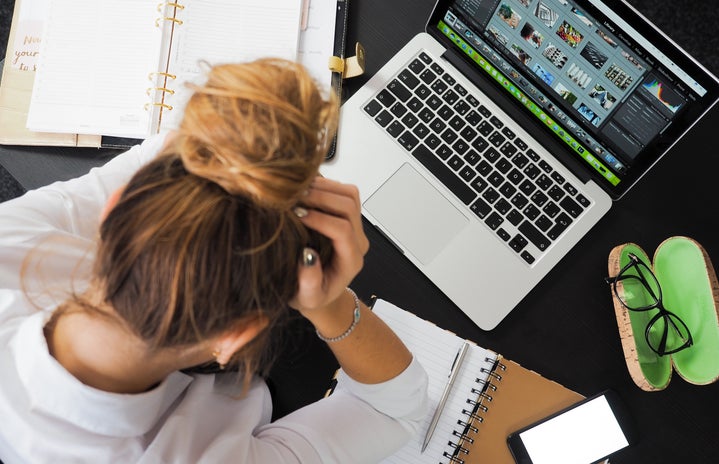The word “productive” has become a staple in 2020. People use bullet journals and to-do lists to track their productivity over days and weeks. We establish values, even subconsciously, for each day based on how productive it felt. We feel adrenaline checking off a task from a list, and we feel guilt realizing we’d spent more time watching TV than intended. Even life coaches explain their journey toward ridding themselves of negative thoughts, saying, “Those emotions aren’t productive.” Furthermore, when people aren’t productive, say they miss a task on their list, they feel the need to justify their unproductivity (something society calls an “excuse”). These elements are all part of “productivity culture.”
But is it possible to be over-productive? Is it possible to overwork yourself to the point where you aren’t enjoying life anymore? Is it healthy to obsess over how you allocate your time, and feel guilty about spending time with friends or relaxing? And aren’t excuses a terrible thing to do to yourself, to justify being a worse version of yourself than you could be?
During the pandemic, productivity culture has manifested itself in unique and often exaggerated ways. Because many of us were sheltered-in-place and had little control over our lives, we felt the need to hyper-control the areas we could. I found myself making a rigid and impossibly packed hour-by-hour schedule for myself and getting disappointed when I could not follow through. Many of my friends felt the need to take on countless virtual internships and positions to compensate for the opportunities they felt they had missed. All of them felt terrible using COVID as an “excuse” to justify not following their timelines.

Productivity, depending on how you define it, is generally a positive thing. However, valuing yourself solely based on your productivity is invasive and damaging. Hour-by-hour schedules can serve as a great guideline if you’re feeling overwhelmed with work, but if you find yourself not following them, just know that life is full of spontaneity and unpredictability. Being able to put your work aside when a more beneficial opportunity presents itself is an important ability, even if that opportunity may be seeing a friend that you haven’t in a while. Furthermore, sometimes making an excuse that you deserve to take a break can be a healthy form of self-validation.
Here are some unhealthy “productive” habits, and tips on how to break them:
#1: Shaming yourself for “unproductive” emotions.
Though it’s often unhealthy to dwell too long, people should recognize that emotions aren’t always meant to be productive. Experiencing sadness and anger at times is a part of life, and is completely unavoidable — no matter how logical you are. Let yourself experience emotions. And when a friend comes to you with an issue, do yourselves and society a favor by not pointing out, “There’s no point in being sad.” People already know this, and yet, they feel sad anyways.
#2: Hyper-restricting your day-by-day schedule.
Though an hourly breakdown can be helpful for some people, if you’re like me, you feel like a fish out of water as soon as plans change — which they do. Because life is unpredictable, and when a group of friends asks to go to your favorite coffee shop or they’re finally ready to play Portal 2, you don’t want to say no (and shouldn’t if that makes you happy!). I combatted my struggles with changing plans by making the switch to a simple daily and weekly task list. If necessary, I would only plan the couple hours ahead of me, rather than the whole day at once.
#3: Not recognizing the vast varieties of “productivity” (especially during the pandemic).
Generally, social tasks, such as chatting with your roommate, watching TV with your sister, or going out and grabbing boba, are considered unproductive. However, you can define productive to be anything that helps you accomplish your college goals (including your social goals). Think about your values in the long run. I consider establishing a strong support system of friends and having great family relationships a part of my goals for college. Therefore, those hour-long chats with my roommate are, to me, productive.
#4: Obsessing over old task lists.
This advice may seem counterintuitive, because for a lot of people, keeping around a reminder of the amount they’ve accomplished is actually helpful. However, for me, I found it damaging when I realized there were so many things on my list that weren’t getting done. It’s not healthy to solely focus on the past. Just focus on the future and how you can redistribute your tasks to complete them on time. For me, it’s been easiest to simply keep a whiteboard, and erase it daily. This way, there’s no permanent record of everything I’ve ever done, and if it turns out I don’t actually want to do something anymore, I can simply erase and forget about it.
#5: Overloading your schedule.
At the beginning of the semester, my schedule looked like a mess. I was having to pull off the two-prom-dates movie trope: Zoom style. However, I trimmed down after I discovered the clubs that matter to me. If there are things you’re tempted to leave on your schedule because it’s only one hour a week, don’t do it. Think about it this way: You could spend an extra hour a week hanging out with your family, working on a passion project of yours, or even chilling and watching TV. Don’t waste time doing things you don’t care about, even if they look good on your resume.

#6: Invalidating your “excuses” to enjoy your life.
This thought process is one of the worst habits I observe in others. The first issue stems from letting yourself believe that you need an excuse to be happy, as if it’s a negative thing. “I’m allowed to go out this week because I just completed a midterm, right?…but I shouldn’t keep making excuses to go out.” There’s always a valid reason for you to do something you enjoy, so you should go for it! On the contrary, there’s rarely a good reason to force yourself to study the whole day without breaks. If it helps to justify the decision to enjoy yourself, you can. However, don’t invalidate your reasoning because it’s great to enjoy yourself, not just once in a while, but every day.




